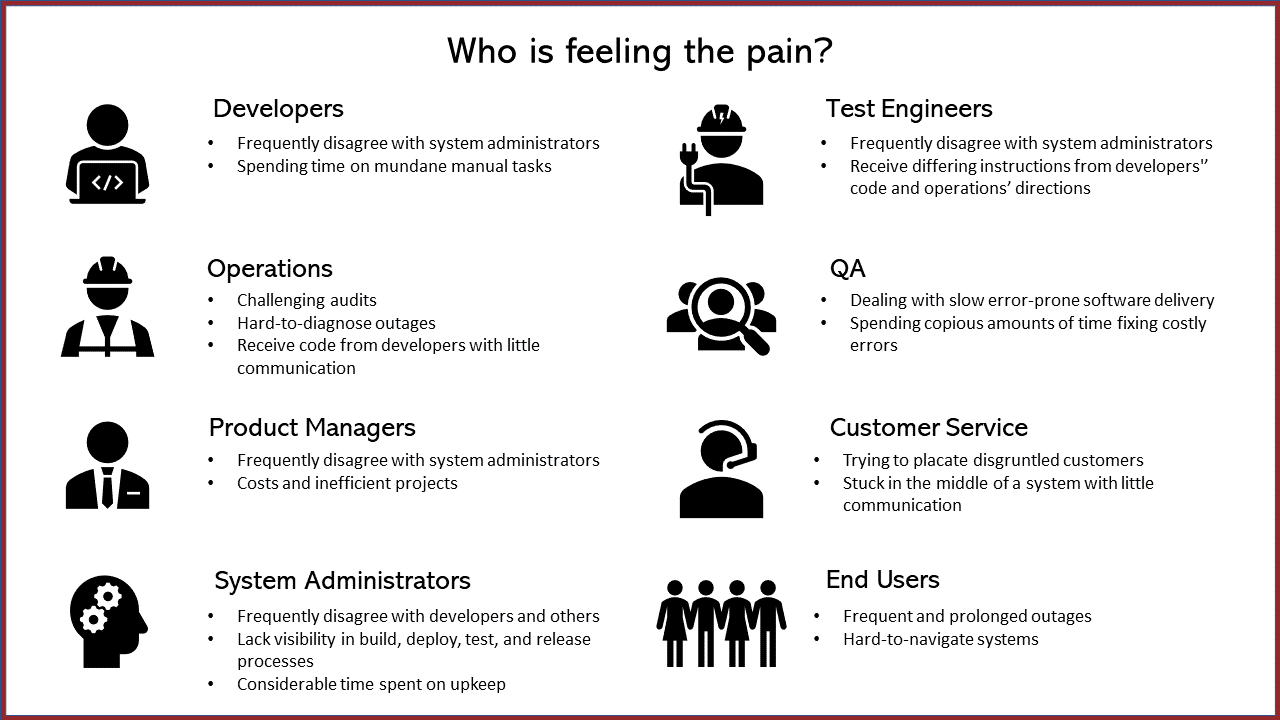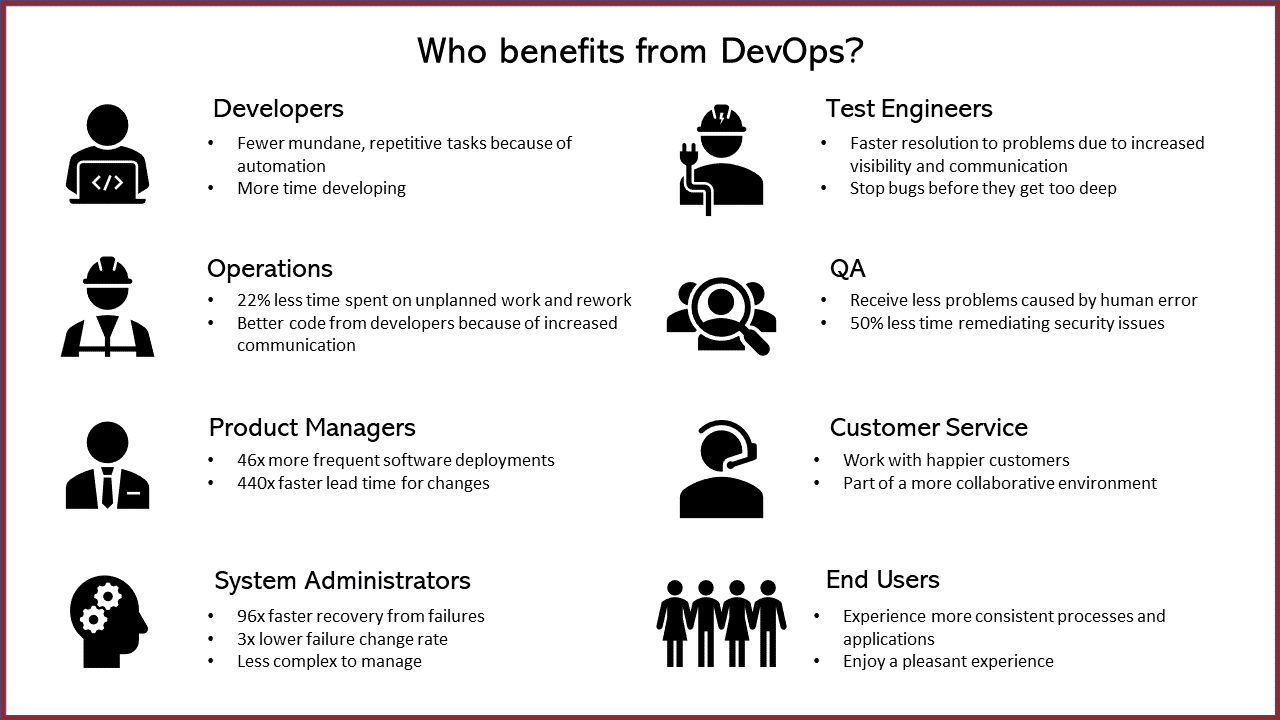Businesses face rapid changes and high demands every day.
Modern consumers have ever-changing demands and higher expectations for businesses than their predecessors. Increasing competition means companies have to act quickly and intelligently to hold their share of the market. Organizations are constantly battling with their rivals, striving to provide the best product for their customers.
In order to be successful, you must deliver a good product/service, and you can’t do that without good software. Today, every company is a tech company. IT teams must increase their efficiency and adaptability when building and deploying software to meet modern demands.
But IT aren’t the only people involved in the technological aspects of companies. When technology is lacking, everyone struggles in one way or another.

The root cause of many (if not all) of these difficulties is lack of communication. For many companies, DevOps is the solution to their continuous struggles.
“DevOps was created to resolve this dilemma by integrating everyone associated with software development and deployment – business users, developers, test engineers, security engineers, system administrators, and sometimes others – into a single, highly automated workflow with a shared focus: rapid delivery of high-quality software that meets all user requirements while maintaining the integrity and stability of the entire system.” (Source: What is DevOps?)
83% of organizations are implementing DevOps practices, according to Puppet’s 2021 State of DevOps Report survey. This method of agile thinking involves collaboration between customers, product management, developers, QA, and other roles in order to advance toward a better product, service, and/or system.

So, let’s jump into it. What are the benefits of DevOps by role?
Developers
If you’re a developer without DevOps, you’re probably frustrated with the mundane tasks of building and deploying processes. You don’t have time be creative or innovative because you have to complete the same tasks over and over again.
With DevOps and automation, the mundane, repetitive tasks can be eliminated! With those time-consuming items out of the way, you have more time to do what you love: developing! More time innovating and less time fixing and maintaining is a win.
And don’t you want to be involved in the operating of your software? That will happen, too, as DevOps knocks down silos and increases collaboration.
Operations
One of the classic pre-DevOps problems for operations is getting random, usually error-ridden, code passed to you from developers. With very little communication, it takes longer to get to resolutions and makes your job harder. You’re concerned about maintaining environmental stability, which is hard to do when code is thrown at you over the wall.
With DevOps, operations personnel reported spending 22% less time on unplanned work and rework. This is primarily due to the increased communication with developers. Better code, a shared code base, and more stable operating environments make your life easier.
Automation and Continuous Integration allow new features to be delivered without threatening stability.
Product Managers
It’s hard to beat your competition when your products and services take longer to be made and put into action. It’s especially difficult when there are errors in your software.
DevOps encourages a collaborative environment. When there is more communication in the production process, the result is better products. When everyone is on the same page, the final product is bound to be better.
Not to mention that your job is easier with 46x more frequent software deployments and 440x faster lead time for changes!
System Administrators
It’s nearly impossible to effectively and efficiently manage a team that never talks. The lack of communication makes your job difficult because the software has errors, feedback is untimely, and visibility is low.
Collaboration is one of the key tenants of DevOps. Communication results in better products and better systems. Additionally, they are less complex to manage. Automating reduces human errors, resulting in a 3x lower failure change rate.
DevOps also increases visibility throughout the entire software development process. When you’re able to detect errors, locate their origins, and discover the cause, you can get the problem fixed. DevOps results in 96x faster recovery from failures.
Test Engineers
It’s hard to fix a problem when you can’t see where it originated and who caused it. Stress sets in when you can’t find the issue, can’t fix it, and know that every passing minute means more and more people are inconvenienced (and probably upset about it).
DevOps allows for faster problem resolutions. Both increased visibility and communication are essential in fixing issues. Engineers can use real-time data to solve problems and understand the impact of application changes. When something goes awry, the sooner a solution is implemented, the better. If a bug gets too deep, it becomes harder to fix. And that’s a headache.
QA
It’s your job to make sure products and systems are all good to go. But that doesn’t mean that you enjoy error-ridden software and processes. It’s nice to have at least some things work on the first try. However, without communication, collaboration, and automation, (all pillars of DevOps) errors run rampant.
With DevOps, team members work together to produce a better product and automation reduces the easily prevented human errors. The result? Less errors. And where there are errors, they are smaller and easier to fix, thanks to Continuous Integration and Continuous Delivery and their frequent small changes. DevOps users report 50% less time remediating security issues and 96x faster recovery from failures.
Customer Service
Anyone who’s ever worked in the service industry, whether in a restaurant, retail, or customer service, knows the pain of dealing with disgruntled customers. And customers aren’t happy when there are outages and errors in your system. You didn’t create them, but you have to deal with them.
DevOps results in less errors, which means happier customers. Yes, you’ll still get calls from customers with complaints, but they’ll probably be fewer and further in between. Plus, they will be more understanding than if they experienced the same problem repeatedly.
A more collaborative environment means your job is easier.
End Users
What is the point of any changes? To better the user’s experience. Even if you’re streamlining a process for yourself, that means you will have more time to make more improvements for your clients and customers.
DevOps makes the end user’s experience more consistent by improving processes and applications. Overall, making the interaction more enjoyable.
Everyone benefits!
As you can see, everyone benefits from some of the cornerstones of DevOps, like Continuous Integration, Continuous Delivery, Release Automation, Test Automation, and collaboration. Continuous Integration nearly eliminates the chances of a major outage or error. Automated processes remove tedious and manual tasks. Collaboration creates a coordinated team and improves the final product.
DevOps creates happier and more productive teams. People don’t have to complete the same boring tasks and solve the same problems over and over again. Decreased frustration and unhappiness lead to more productive and effective team members. You’ll get to eliminate some of the unsatisfying parts of your job and add value to your organization.
Team efficiency is peaked, with more creative and innovative tasks, collective responsibility, and increased communication. When silos are broken down, you’ll all have a clearer vision with a common goal and a plan to reach it. Additionally, increased transparency leads to smarter decisions. Empowered, confident, and collaborating teams move more quickly and effectively, resulting in faster releases and smarter work.
If something goes awry or there is unplanned work, communication helps the team manage the unexpected hurdles. DevOps establishes processes and clear priorities to guide you and your team members to accomplish the unplanned work while continuing with your original plans.
When employees are doing what they love, they are more engaged and happier. DevOps doesn’t solve tooling problems; it solves human problems. And happy employees lead to happy customers.
Even the company benefits.
With better processes and an environment of communication, the company benefits. But not only in the emotional everyone-is-friends way, but also financially. With content employees who get to do what they like to do and customers who get a better experience, a company’s bottom line improves.
There is a tangible increase in ROI as DevOps saves time and resources and accelerates the company’s velocity and competitiveness. The organization is able to deliver features faster and get to market more quickly because of Continuous Integration, Continuous Delivery, Release Automation, Test Automation, and collaboration. The team is proactive, rather than reactive, as it meets new market demands and deals with security threats.
“My latest research found that companies in which DevOps interactions were rated as ‘excellent’ or ‘above average’ were more than 10X as likely to have had double-digit revenue growth in the prior year, compared to companies whose interactions were rated as ‘average’ or ‘poor’.” ~Julie Craig, Enterprise Management Associates’ Research Director.
Continuous feedback allows companies to hear from customers more frequently. As a result, organizations can deliver software that is timelier and more relevant. You can more quickly respond to your customers’ ever-changing demands. Again, improving the user’s experience.
Work smarter and release faster.
Every company is a tech company. Without fast software, you would never be able to get your products to market. Without DevOps, you wouldn’t be able to have fast software.
DevOps aligns IT with business objectives. It creates a team focused on creating value and continuously improving the organization. Creating the best customer experience is a top priority and everyone works together to create and maintain the best possible products and services.
DevOps pairs speed with direction for the business’s benefit.
“The most important reason the most successful companies have adopted DevOps is they share a need to operate like small companies while delivering large company results.” ~Dan Turchin, VP of Product at BigPanda
Ready to get these benefits for yourself?
Have you experienced any of these struggles before DevOps or these benefits with DevOps? Do you have any other benefits of DevOps to add for your role? Please share your thoughts in the comments!




